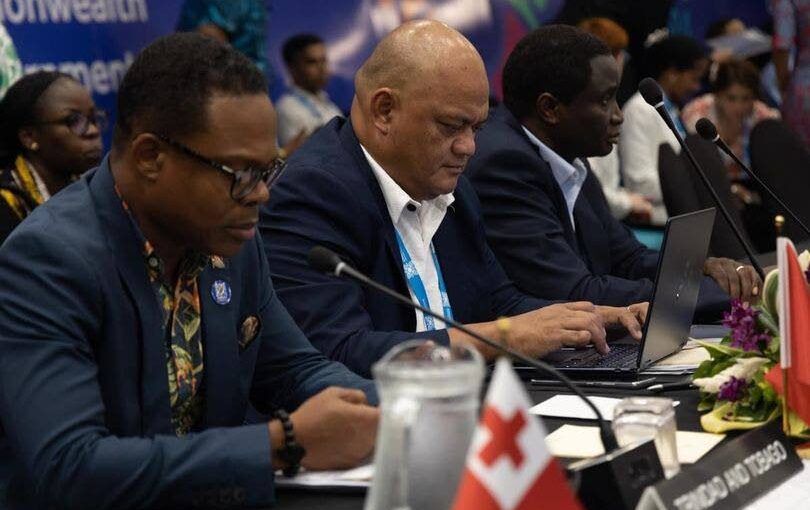... becomes the largest operator of CNG trucks in Nigeria In a demonstration of its support for President Bola Ahmed Tinubu’s CNG...
Vous n'êtes pas connecté
- English
- Français
- عربي
- Español
- Deutsch
- Português
- русский язык
- Català
- Italiano
- Nederlands, Vlaams
- Norsk
- فارسی
- বাংলা
- اردو
- Azərbaycan dili
- Bahasa Indonesia
- Հայերեն
- Ελληνικά
- Bosanski jezik
- українська мова
- Íslenska
- Türkmen, Түркмен
- Türkçe
- Shqip
- Eesti keel
- magyar
- Қазақ тілі
- Kalaallisut ; kalaallit oqaasii
- Lietuvių kalba
- Latviešu valoda
- македонски јазик
- Монгол
- Bahasa Melayu ; بهاس ملايو
- ဗမာစာ
- Slovenščina
- тоҷикӣ ; toğikī ; تاجیکی
- ไทย
- O'zbek ; Ўзбек ; أۇزبېك
- Tiếng Việt
- ភាសាខ្មែរ
- རྫོང་ཁ
- Soomaaliga ; af Soomaali
Rubriques :
 Maroc - EURASIAREVIEW.COM - A la une - 17/Sep 22:59
Maroc - EURASIAREVIEW.COM - A la une - 17/Sep 22:59
Geopolitics, Thy Name Is Climate Change – OpEd
Bangladesh was still reeling from political turmoil, which felled Prime Minister Sheikh Hasina’s government on August 5, when a flood disaster struck out of the blue, upending the lives ofsix million Bangladeshis. Half a million people were left to their own devices, beyond the reach of first responders. Worst of all,two million children were exposed to the aftermath of flooding. Dhaka had not seen a deluge like this in the past three decades. Yet the country is no stranger to disasters. Just in May this year, it wasbattered by Storm Remal, devastating millions. In 2023, it wasCyclone Mocha that visited its wrathon two neighboring states: Bangladesh and Myanmar. The speed and severity of flash floods is equally quick to inflame geopolitical tensions, asDhaka accused neighboring Indiaaggravating the situation by opening the floodgates of a dam in a neighboring state.India denied the chargeand blamed erratic monsoons for swelling the transboundary Gomati River that overflowed its banks.Bangladesh and India share 54 transboundary rivers, including the Ganges and Yamuna. As an upstream country, India is viewed with suspicion by downstream Bangladesh. All downstream nations suspect their upstream neighbors in the event of such calamities. For its part, India blames upstream China for major diversions on transboundary rivers. Similar accusations are heard among 11 riparian nations on the Nile. All this shows how climate change shapes geopolitics. Each time a developing nation is struck by an epic calamity, ittakes 10-20 years to fully recoverfrom the impact.Disasters worsen the pre-existing vulnerabilitiesof those affected, hindering their recovery. Viewing these impacts,Bangladesh estimates that 20 million of its citizenswill become “climate refugees” in the next 25 years,while 30 million are set to lose everything from climate change. It wants Western nations to recognize climate refugees as they do victims of “political repression.”Rajendra Pachauri, a former chairperson of the UN Intergovernmental Panel on Climate Change (IPCC), echoes Dhaka’s call for what he describes as “managed migration.” Unmanaged migration, however, continues. There are already13 million Bangladeshissettled in Europe, North America, and the Middle East. The ferocity of monsoons is forcing millions from their native habitats. Monsoons smash riverbanks, deluging countries on a monumental scale. Although shorter in duration, monsoons pack crushing punches. In 2022, southeastern Pakistan had receivedtriple the amount of monthly rain in just one day. Monsoons are being fueled by the ever-warmer oceans that burst “atmospheric rivers.” The Bay of Bengal, where monsoons rise, and the Indian Ocean, which is the world’s fastest-warming ocean, are literally blazing. Asia’s sea surface temperature iswarming more than three times faster than the global average. The continent’s land surface temperature has already surpassed the maximum threshold of 1.5 degrees Celsius to which the world agreed in Paris in 2015. Asia’s highest surface temperature in 2023 was recorded as 1.92 degree Celsius above the 1961-1990 level (not the pre-industrial level). Asian countries such as Bangladesh, which have made the least contribution to carbonizing the atmosphere, are the most affected. In 2013, the UN Intergovernmental Panel on Climate Change (IPCC), in itsfifth assessment report, predicted “less frequent but more intense” extreme weather events around the globe. Mother Nature, somehow, seems far ahead of the United Nations. As the case of Bangladesh shows, storms that are making landfalls around the world, are as frequent as they are intense. Weeks after the UN’s fifth assessment report came out, the Philippines enduredtyphoon Haiyan that killed 10,000 Filipinos, unleashing its fury on 13 million, 5 million of them children.Economic losses were valued at $15 billion(5 percent of the Philippine economy in 2013). Haiyan was then declared thestrongest-ever superstorm in meteorological annals. Now scientists are thinking aboutadding a sixth hurricane categoryas Category-5 hurricanes are becoming passe. Yet the world is far from equipped to tame climatic disasters. Haiyan, for instance, packedwind gusts of up to 235 miles per hour, a wind velocity that is almost twice the speed of the yet-to-be-invented Category-6 hurricane. Maniladeployed18,177 military troops, 844 vehicles, 44 seagoing vessels, and 31 aircraft to deal with the problem, and it still wasn’t enough. It had to call in military reinforcements from Australia, Britain, China, Japan, and the United States. The Philippines never faced a national adversary with a fraction of Haiyan’s lethality. The United States committed the largest of all military resources to support the Philippines. It commissioned the nuclear-powered aircraft carrierUSS George Washingtonwith 80 aircraft and 5,000 troops aboard, in addition to four additional naval ships. Britain sent the Illustrious aircraft carrier stocked with transport planes and medical personnel. Japan sent a naval force of 1,000 troops, which was Tokyo’s largest-ever disaster-relief deployment, with three navy ships led by the Ise,Japan’s largest warship. Yet Haiyan kept all these naval deployments from entering the “disaster zone” for three days until November 11. By then, it had already made history as the Philippine deadliest storm. Seven years later, in 2020, Australia had the lengthiest season of climate-driven wildfires, the intensity of which theThe New York Timesdescribed in a breathtaking headline as “an atomic bomb.” For the first time in its history, Australia issued a “compulsory call-out” of its Defense Force Reserve Brigades, and deployed thousands of soldiers, sailors and airmen to battle the raging fires and help evacuations. Yet the Australian military alone was no match for the blazes. Seventy countries, including Canada, New Zealand, Singapore, and the United States, offered assistance. Theeconomic cost of fires was put at $103 billion. Worst of all,one billion animals were burned to deathin this climate-fueled inferno. The Asia-Pacific is set to seethe economic tab of climatic disasters double to $1.4 trillion a year(which is 4.2 percent of regional GDP). By the middle of the twenty-first century,the global toll of climate-driven calamities will reach $38 trillion a year. How ironic it is that 200 world leaders at the climate summit (COP29) in Baku, Azerbaijan, this November, will be fighting tooth and nail to commit the least possible amount to the $100 billion global climate fund, which is basically a cleanup cost of climate change. Yet they have no remorse in having future generations pay $38 trillion a year as a penalty for climate breakdown. The cost of all wars, including world wars, fought in the twentieth century is not nearly as much as this amount. It is, however, heartening that theclimate envoy John Podestahas announced U.S. support for Azerbaijan’s initiative of the New Collective Quantified Goal on climate finance. In a U.S.-China Working Group meeting in Beijing in September, Podesta urged China to support this initiative. Both will cohost a summit of world leaders assembled at COP29 to urge more aggressive cuts in greenhouse gas emissions. In all of this, climate change is defining itself in geopolitics. This article was published at FPIF
Articles similaires
Window into forex problem
THE GOVERNMENT’S decision to resume the importers’ limb of the EximBank’s preferential access window – at a reduced allocation of US$25...
Browne unfazed by push-back on reparations
DR AMERY BROWNE, Minister of Foreign and Caricom Affairs, is undaunted by the negative signals coming from the United Kingdom regarding calls by...
One Year On Operation 1027: Its Impact On Myanmar And Beyond – OpEd
As we marked the first anniversary of Operation 1027, initiated by the Three Brotherhood Alliance (3BHA) on October 27, 2023, it is essential to...
Climate Objectives Of COP29 May Be Unmet – Analysis
By Yi Wang The 29th Conference of the Parties to the United Nations Framework Convention on Climate Change (COP29) will be held from November 11...
To Reduce Violent Conflict, Support Non-Violent Resistance Movements – Analysis
By Dr Bryan Sims It is unsurprising that as the world entered its 18th consecutive year of democratic decline, it was also experiencing a record...
Nomzamo Mbatha shares how climate creativity is reshaping our future
Delegates from around the world, including Prince William and model and TV host Heidi Klum were in Cape Town for the 2024 Earth Shot Prize summit. The...
Bangladesh: Bold Steps Needed To Boost Garment Sector – OpEd
BGMEA had demanded a massive production disruption due to recent labor unrest. Apart from this, there have been various incidents including factory...
Complex Systems And The US Election – OpEd
With the US presidential election mere days away, American citizens first and foremost – but also people in other countries, given what is at...
Agricultural Cooperation Among BRICS Countries: A Panacea For Food Security In The Global South? – Analysis
Agricultural cooperation among BRICS countries is a crucial tactic to address the pressing issues of hunger, poverty, and malnutrition that afflict...
Les derniers communiqués
-
Adobe Brings Conversational AI to Trillions of PDFs with the New AI Assistant in Reader and Acrobat
Adobe - 21/02/2024
-
Laura Frigenti takes the Helm as Chief Executive Officer of the Global Partnership for Education
Global Partnership for Education - 05/12/2022



